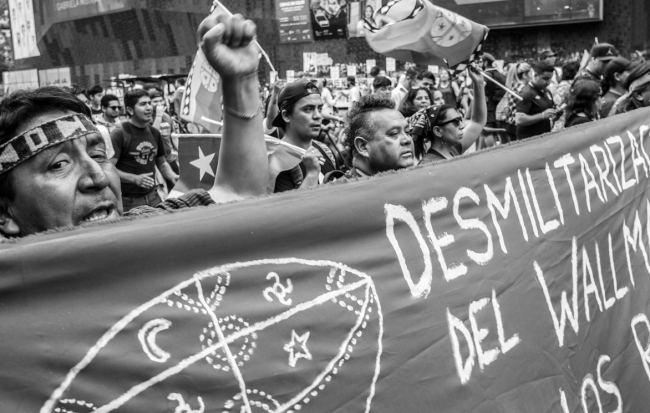by KELLY BAUER

Throughout Chile’s constitutional process, right-wing rhetoric has rejected Indigenous recognitions and representation in defense of the status quo.
Beginning in October 2019, the Mapuche flag became a regular fixture at the mass protests known as the estallido social across Chile. In multiple cities, demonstrators toppled statues of colonizers, rejecting the symbols of centuries of colonialism and oppression. Since the uprising, Indigenous rights have become an increasingly prominent part of Chilean political conversations. When 155 delegates began drafting a new constitution in 2021, 17 were Indigenous representatives, and Mapuche scholar Elisa Loncon served as president of the Constitutional Convention for the first six months. Together with other representatives, their work led to the inclusion of many Indigenous rights and recognitions in the draft constitution.
In Chile, Indigenous rights fall behind international standards and the recognitions enshrined in other countries in the region. Although the draft constitution represented a significant shift towards upholding Chile’s international commitments, such conversations about Indigenous rights were new to many Chileans. Throughout the constitutional process, political elites circulated ambiguous, deceptive, and incorrect information about Indigenous rights that often went viral on social media or became fodder for primetime TV. The most frequently repeated claims asserted that Indigenous rights recognitions would eliminate private property and would allow Indigenous communities to secede from Chile and veto all future political reforms.
In a plebiscite on September 4, 2022, 62 percent of voters rejected the draft constitution. According to a poll by Cadem carried out days after the vote, plurinationalism and Indigenous autonomy were the second most referenced reason for voting “Rechazo” (reject); 35 percent of survey respondents listed it as one of their reasons, and 16 percent mentioned it first.
Indigenous rights, and particularly plurinationalism, figured prominently in analyses of the plebiscite result. In the wake of the vote, right-wing politicians and those in the Rechazo camp repeated campaign language that implied that a vote against the draft constitution was a vote against Indigenous rights: “Chile is one,” “Thank you for defending Chile,” and “We want peace.” Right-wing former presidential candidate José Antonio Kast said the plebiscite highlighted the “failure” of current President Gabriel Boric’s government and called on the administration to “stop the advance of terrorism and violence in rural areas, in Arauco, Araucanía, and the north.” Deflecting from addressing rights recognitions and Indigenous demands, this strategic language called for immediate responses to concerns about insecurity, selectively naming locations many Chileans would associate with the so-called “Mapuche conflict” in the south (and with migrants in the north).
Boric, for his part, called in a speech on September 4 for building on existing consensus around women’s and children’s rights; Indigenous rights were noticeably absent from this call to action. Two phrases implicitly communicated that the government would move forward with a muddled approach to Indigenous rights. First, in a passage reminiscent of “Chile is one” rhetoric from those opposing the constitution, Boric said: “We?…?know that we have one culture, traditions, and symbols that we must respect and honor.” Then, discussing the government’s “obligation to meet the demands of our compatriots in their daily lives,” Boric listed “insecurity” and “violence in the south” as areas where Chileans “expect strong answers and solutions.” While ambiguous, these statements suggested to voters that the government would significantly scale back their work to promote Indigenous rights recognitions to appease concerns about division and security.
NACLA for more
